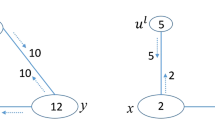Abstract
We analyze a mechanism that provides strong incentives for the submission of truthful feedback in virtual communities where services are exchanged on a peer-to-peer basis. Lying peers are punished with a severity that is exponential to their frequency of lying. We had first introduced and evaluated experimentally the mechanism in [1]. In this paper, we develop a Markov-chain model of the mechanism. Based on this, we prove that, when the mechanism is employed, the system evolves to a beneficial steady-state operation even in the case of a dynamically renewed population. Furthermore, we develop a procedure for the efficient selection of the parameters of the mechanism for any peer-to-peer system; this procedure is based on ergodic arguments. Simulation experiments reveal that the procedure is indeed accurate, as well as effective regarding the incentives provided to participants for submitting truthful feedback.
The present work was partly funded by the IST project EuroNGI (IST-2003-507613).
Preview
Unable to display preview. Download preview PDF.
Similar content being viewed by others
References
Papaioannou, T.G., Stamoulis, G.D.: An Incentives’ Mechanism Promoting Truthful Feedback in Peer-to-Peer Systems. In: Proceedings of the 5th IEEE/ACM International Symposium in Cluster Computing and the Grid, Cardiff, UK (2005)
Papaioannou, T.G., Stamoulis, G.D.: Effective Use of Reputation in Peer-to-Peer Environments. In: Proceedings of the 4th IEEE/ACM International Symposium in Cluster Computing and the Grid, Chicago, Illinois, USA (2004)
Dellarocas, C.: Immunizing Online Reputation Reporting Systems Against Unfair Ratings and Discriminatory Behavior. In: Proceedings of the 2nd ACM Conference on Electronic Commerce, Minneapolis, MN, USA (2000)
Schillo, M., Funk, P., Rovatsos, M.: Using Trust for Detecting Deceitful Agents in Artificial Societies. Applied Artificial Intelligence 14, 825–848 (2000)
Damiani, E., di Vimercati, S.D.C., Paraboschi, S., Samarati, P.: Managing and Sharing Servents’ Reputations in P2P Systems. IEEE Transactions on Knowledge and Data Engineering 15, 840–854 (2003)
Yu, B., Singh, M.P.: Distributed Reputation Management for Electronic Commerce. Computational Intelligence 18, 535–549 (2002)
Aberer, K., Despotovic, Z.: Managing Trust in a Peer-to-Peer Information System. In: Proceedings of the 10th International Conference on Information and Knowledge Management, New York, NY USA (2001)
Jurca, R., Faltings, B.: Eliciting Truthful Feedback for Binary Reputation Mechanisms. In: Proceedings of IEEE/WIC/ACM International Conference on Web Intelligence, Beijing, China (2004)
Antoniadis, P., Courcoubetis, C., Mason, R., Papaioannou, T.G., Stamoulis, G.D., Weber, R.: Results of peer-to-peer market models, Project IST MMAPPS: Deliverable 8 (2004), Available at: http://www.tik.ee.ethz.ch/~mmapps/www.mmapps.org/results/main.html
Feldman, M., Papadimitriou, C., Chuang, J., Stoica, I.: Free-riding and white-washing in peer-to-peer systems. In: Proceedings of the ACM SIGCOMM Workshop on Practice and Theory of Incentives in Networked Systems, Portland, Oregon, USA (2004)
Fowler, J.H.: Altruistic Punishment and the Origin of Cooperation. Proceedings of the National Academy of Sciences of the United States of America 102, 7047–7049 (2005)
Author information
Authors and Affiliations
Editor information
Editors and Affiliations
Rights and permissions
Copyright information
© 2006 Springer-Verlag Berlin Heidelberg
About this paper
Cite this paper
Papaioannou, T.G., Stamoulis, G.D. (2006). Optimizing an Incentives’ Mechanism for Truthful Feedback in Virtual Communities. In: Despotovic, Z., Joseph, S., Sartori, C. (eds) Agents and Peer-to-Peer Computing. AP2PC 2005. Lecture Notes in Computer Science(), vol 4118. Springer, Berlin, Heidelberg. https://doi.org/10.1007/11925941_1
Download citation
DOI: https://doi.org/10.1007/11925941_1
Publisher Name: Springer, Berlin, Heidelberg
Print ISBN: 978-3-540-49025-8
Online ISBN: 978-3-540-68967-6
eBook Packages: Computer ScienceComputer Science (R0)




